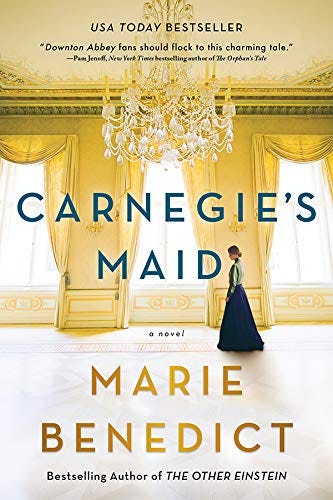Carnegie's Maid by Marie Benedict
Carnegie’s Maid
Author: Marie Benedict
Genre: Historical Fiction
Date: 09 October 2021
Rating: 3 stars
Review: I could lie and say I knew that the book was based on a real person. I can also lie and pretend to be smarter than I am truly. But anyone who has read my previous reviews has no such delusions. I picked up this book because it featured in some must-read historical fiction lists I found sometime back. Only as I flipped the last page of the book and read the Acknowledgement page did I realise it was based on the tycoon Andrew Carnegie. Will you think it a lie if I say that the pieces kind of fell in place and I realised I might have heard of him before? It is true!
Carnegie’s Maid is the story of Clara Kelly, a young girl from rural Ireland who is sent to America to earn money for her family still facing the consequences of the famine. Her family is under threat from a landlord out for their land and she is their only hope. But on disembarking the ship she realises that things are not going to be easy. That’s when she realises that a Clara Kelly, travelling by second-class on the same ship, has died during the journey across the Atlantic. This woman by the same name as her was to be picked up and taken to Pittsburgh where she would work as a lady’s maid to a foreboding Mrs Carnegie. With her other option looking pretty dire, Clara jumps on the opportunity and decides to pretend to be lady’s maid Clara Kelly, with no knowledge of the job or the family she is meant to work for.
Mrs Carnegie, Clara’s new mistress, is a hard taskmaster. She is difficult to please and a stickler for rules, only showing her vulnerabilities in the privacy of her own room. Clara forces herself to learn how to be a good lady’s maid and as a result indispensable to Mrs Carnegie. While she doesn’t make any friends downstairs, she ends up becoming a strange addition to the rest of the family. She is kind, smart and a quick learner but more than that she has a business acumen that makes her a strange confidante of Mrs Carnegie’s elder son, Andrew. That is, the famous tycoon Andrew Carnegie who I failed to recognise while reading the book.
The cover of the book announces that any fan of Downton Abbey must pick this book up. I can see the comparison but I don’t particularly agree with it. For starters, this book is set during the late 1800s in Pittsburgh America, to be specific during the Civil War. It has none of the good cheer and joy that Downton has, being very dark in its portrayal of everything. Okay, okay! This is making it sound like the book wasn’t good. It was fine! My point was that this kind of comparison on the cover takes away from the story itself because I was left a little disappointed.
The book draws comparison between the fortune of Andrew Carnegie, an immigrant from Scotland himself, and the many immigrants that lived in horrifying conditions, living hand to mouth. Benedict goes into details about the Irish famine and revolution, topics that were very interesting and I would have loved for her to delve deeper into them. I also enjoyed reading about the struggles of Mrs Carnegie as she determinedly tries to fit into the echelons of the American upper-class. The development of a relationship between Andrew and Clara, that walks a tightrope between a romantic one and a mentorship, was enjoyable to read, even if it did have a disappointing end. You go into such books hoping for a Cinderella story, where love triumphs all, even the boundaries of class and position.
I think that’s the reason I didn’t like the book as much as I could have. If I had known that the story was based on a true story I would have gone into it with a particular mindset instead of expecting a different tale from it. If I had known that, then I also would not have been as annoyed by the pages and pages taken up by discussions on the iron industry, railway industry and investments of Andrew Carnegie. Context is key. Benedict emphasises on those aspects because they hold importance to Andrew Carnegie’s story. There I was hoping the story would take a turn in another direction. But these are things that I didn’t like about the book even though it wasn’t the book’s fault.
Regardless of these points about the plot, I had a slight problem with the writing. Benedict has written this book in first person from the point of view of Clara in short chapters. It skips ahead in weeks and days and then in the end several decades to when the character’s are much older. I don’t normally appreciate that but it kind of worked given the intention of the book. But her writing was very clunky. It didn’t flow and so I just couldn’t read a lot in a stretch even though that’s what short chapters help me to do. I kept getting stuck while reading the book. Very unique and quirky tics of the characters were mentioned but none of them were developed to give us a fully-fleshed cast. The book is a short one and for the first time I wanted it to be longer so she could have paid more attention to building the world and taking us through the stories of each of the characters. Instead of answering questions it left me with more questions.
The moral of the story is clearly that I should read up on a book before reading the book.



